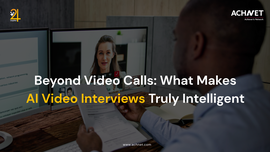Can AI Replace the Role of HR in the IT Industry?
Artificial Intelligence is revolutionizing the Human Resources field in many aspects. From automating routine tasks to enhancing decision-making, AI has already demonstrated its ability to improve many aspects of HR processes. However, the question arises: Can AI fully replace the role of HR, especially in the complex IT industry?
Are you fully utilizing AI in your talent search?
Take the AI Hiring Efficiency quiz to measure your current approach and achieve greater hiring efficiency!
While AI can streamline various HR functions and improve efficiency, it cannot completely replace the human element that is critical in HR roles. Let's explore how AI is reshaping HR, its potential, and the irreplaceable aspects of human involvement in the IT industry.
1. AI’s Role in Automating HR Tasks
AI is highly effective in automating repetitive and time-consuming HR tasks, particularly in areas like recruitment, employee onboarding, and performance management. This is especially valuable in the IT industry, where hiring skilled talent quickly is a top priority.
However, while AI excels at automating these tasks, it lacks the ability to understand the nuances of human emotions, cultural fit, and organizational dynamics—areas where HR professionals play an essential role.
2. AI in Decision-Making
AI can assist HR departments in making data-driven decisions by analyzing patterns and trends in employee data, improving areas like talent management, retention strategies, and diversity hiring initiatives. For example:
That said, while AI can make recommendations based on data, human judgment is still necessary to interpret these insights and make final decisions. Human resource professionals bring emotional intelligence, empathy, and context to the table—qualities that AI cannot replicate.
3. Human-Centric HR Functions That AI Can’t Replace
AI may be able to handle data and automate processes, but there are several HR functions where human involvement is irreplaceable:
4. AI and HR Working Together
Rather than asking if AI can replace HR, the more appropriate question might be: how can AI and HR work together to improve efficiency and outcomes? AI should be seen as a tool that enhances the capabilities of HR professionals, allowing them to focus on more strategic and human-centric tasks.
In the IT industry, HR professionals can leverage AI to automate routine tasks, analyze large datasets, and make informed decisions. This frees up time for HR to engage in activities that require emotional intelligence, creativity, and interpersonal skills—functions that AI simply cannot perform.
How ACHNET’s AI-Driven Solutions Complement HR
ACHNET’s AI-driven platform is designed to enhance, not replace, HR functions in IT companies. Here’s how ACHNET can support HR professionals:
The Bottomline
While AI can significantly improve efficiency in many HR tasks, it cannot replace the essential human qualities that HR professionals bring to the table, particularly in the IT industry. AI can handle data, automate processes, and provide insights, but human judgment, empathy, and cultural understanding are irreplaceable. ACHNET’s AI-driven platform offers powerful tools that work in tandem with HR teams, enhancing their capabilities and allowing them to focus on what matters most—building relationships, fostering a positive work culture, and ensuring long-term success for both employees and the organization.





